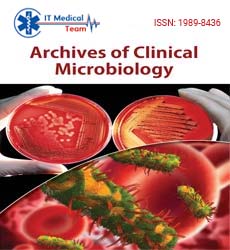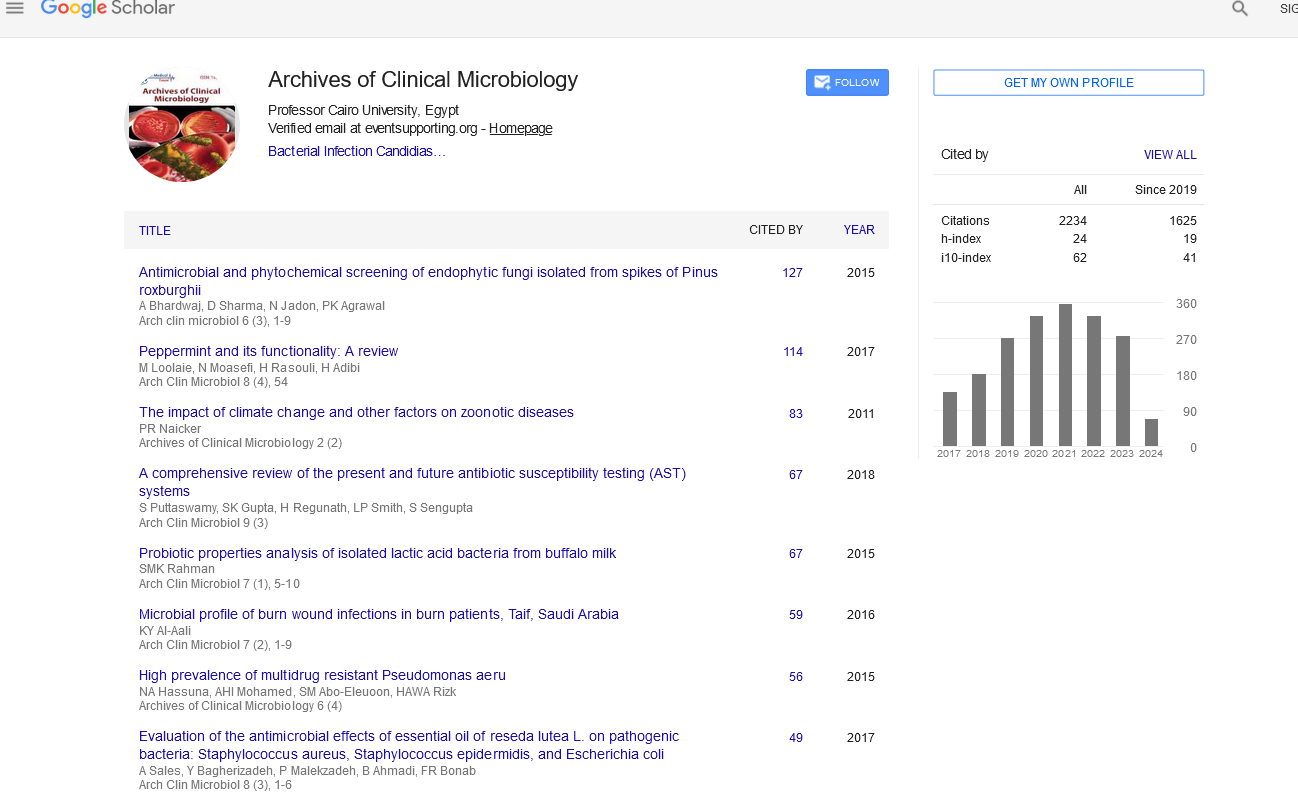Short Communication - (2024) Volume 15, Issue 6
Medical Microbiology: Unveiling the Secrets of Disease causing Microorganisms
Weihua Wang*
Department of Microbiology, University of Edinburgh, Edinburgh, United Kingdom
*Correspondence:
Weihua Wang, Department of Microbiology, University of Edinburgh, Edinburgh,
United Kingdom,
Email:
Received: 22-Jul-2023, Manuscript No. IPACM-23-13965;
Editor assigned: 25-Jul-2023, Pre QC No. IPACM-23-13965 (PQ);
Reviewed: 08-Aug-2023, QC No. IPACM-23-13965;
Revised: 17-Dec-2024, Manuscript No. IPACM-23-13965 (R);
Published:
24-Dec-2024
Abstract
Medical microbiology is a diverse field that focuses on the
study of microorganisms and their role in human health and
disease. This branch of science plays a crucial role in
understanding the mechanisms of pathogenesis, the
development of effective diagnostic methods, the design of
targeted therapies and the prevention of infectious
diseases. In this abstract, we delve into the
multidimensional aspects of medical microbiology,
highlighting key areas of research and their impact on
human health. One of the fundamental components of
medical microbiology is the study of infectious agents,
including bacteria, viruses, fungi and parasites. Advances in
diagnostic techniques have enabled the identification and
characterization of previously unknown microorganisms,
leading to a deeper understanding of their pathogenic
potential. Genomic sequencing and molecular tools have
revolutionized the field, providing insights into the genetic
diversity, virulence factors and mechanisms of antibiotic
resistance in pathogens.
Medical microbiology plays a pivotal role in the
development and monitoring of vaccines. Vaccination has
been one of the most successful public health interventions,
preventing millions of deaths worldwide. By understanding
the immune response to infectious agents, researchers can
design vaccines that elicit protective immunity. Ongoing
surveillance and monitoring of vaccine efficacy and safety
contribute to the control and eradication of infectious
diseases.
Keywords
Medical microbiology; Pathogenesis; Immunity;
Infectious diseases; Vaccine
Introduction
Medical microbiology is a vital field of study that explores the intricate world of microorganisms and their impact on human health. By investigating the characteristics, behaviors, and interactions of bacteria, viruses, fungi and parasites, medical microbiologists strive to understand the mechanisms of infection and develop effective strategies for diagnosis, treatment and prevention of infectious diseases. In this article, we will delve into the fascinating realm of medical microbiology, exploring its significance, methodologies and notable discoveries that have revolutionized modern healthcare [1].
Medical microbiology is a fascinating field that focuses on the study of microorganisms and their interactions with human health and disease. It encompasses the exploration of various bacteria, viruses, fungi, parasites and other microscopic organisms that can cause infections and impact human well-being. Medical microbiologists play a crucial role in understanding the complex world of pathogens and developing effective strategies for their prevention, diagnosis and treatment.
The field of medical microbiology emerged as a distinct discipline in the late 19th century when pioneers like Louis Pasteur and Robert Koch made groundbreaking discoveries linking specific microorganisms to infectious diseases. Their work laid the foundation for the development of microbiology as a scientific discipline and paved the way for numerous advancements in medicine and public health [2].
Description
The significance of medical microbiology
Medical microbiology plays a pivotal role in the identification,
prevention and treatment of infectious diseases. Understanding
the pathogens responsible for diseases enables healthcare
professionals to develop targeted interventions and formulate
appropriate antimicrobial therapies. It also provides insights into
the transmission routes and epidemiology of various infections,
aiding in the implementation of preventive measures such as
vaccination campaigns, improved hygiene practices and infection
control protocols.
Methods and techniques in medical microbiology
Medical microbiologists employ a variety of methods and
techniques to study microorganisms and their impact on human
health. Here are some commonly used approaches:
Microscopy: Microscopy techniques, such as light microscopy,
electron microscopy, and fluorescent microscopy, allow scientists
to visualize microorganisms and their cellular structures, aiding in
identification and characterization.
Culture and isolation: Microorganisms are grown in the
laboratory on culture media, facilitating their isolation and
identification. Pure cultures enable scientists to perform further
tests and study the organisms' characteristics.
Serological testing: Serological techniques detect specific
antibodies or antigens in patient samples, aiding in the diagnosis
of infectious diseases. Examples include Enzyme Linked
Immunosorbent Assays (ELISA) and immunofluorescence assays
[3].
Molecular techniques: Polymerase Chain Reaction (PCR),
nucleic acid sequencing, and DNA fingerprinting are powerful
tools used in medical microbiology to identify microorganisms,
detect antibiotic resistance genes and study genetic variations.
Antimicrobial susceptibility testing: This technique
determines the effectiveness of antimicrobial agents against
specific microorganisms, guiding the selection of appropriate
treatments.
Notable discoveries and contributions: Medical microbiology
has witnessed remarkable breakthroughs over the years, leading
to significant advancements in healthcare. Here are a few
noteworthy discoveries:
Germ theory of disease: In the 19th century, Louis Pasteur
and Robert Koch laid the foundation of the germ theory, which
established that microorganisms are the causative agents of
many infectious diseases. This breakthrough revolutionized the
field of medical microbiology and paved the way for targeted
interventions.
Discovery of antibiotics: The discovery of antibiotics, such as
penicillin by Alexander Fleming, marked a major milestone in
medical microbiology. These drugs revolutionized the treatment
of bacterial infections and saved countless lives.
Vaccine development: Medical microbiology has been
instrumental in the development of vaccines that prevent
infectious diseases. Examples include the polio vaccine, measles
vaccine and the recent development of COVID-19 vaccines.
Identification of new pathogens: Medical microbiologists
continually discover and identify novel pathogens responsible
for emerging infectious diseases. Recent examples include the
identification of Severe Acute Respiratory Syndrome Coronavirus
2 (SARS-CoV-2) as the causative agent of COVID-19 and the
emergence of antibiotic-resistant bacteria.
The future of medical microbiology
As the field of medical microbiology continues to evolve,
several areas show promise for future advancements
Antimicrobial resistance: With the rise of antimicrobial
resistance, medical microbiologists are working to develop
innovative strategies to combat drug resistant pathogens. This includes the development of new antibiotics, alternative
therapies and improved surveillance and infection control
measures.
Rapid diagnostic methods: There is a growing need for rapid
and accurate diagnostic methods that can identify pathogens
quickly, allowing for timely interventions. Advancements in
molecular techniques, such as point of care testing and next
generation sequencing, hold great potential in this regard.
Microbiome research: The human microbiome, the collection
of microorganisms residing within our bodies, is an emerging
area of study [4]. Medical microbiologists are investigating the
intricate relationship between the microbiome and human
health, exploring its role in diseases like obesity, autoimmune
disorders and mental health conditions.
Conclusion
Medical microbiology is an indispensable field that continues
to drive advancements in healthcare by unraveling the mysteries
of disease causing microorganisms. From identifying pathogens
and developing diagnostic tools to discovering new treatments
and preventive measures, medical microbiologists play a critical
role in safeguarding public health. With ongoing research and
technological advancements, the future holds immense
potential for further breakthroughs in this captivating discipline,
ultimately leading to improved strategies for the prevention,
diagnosis and treatment of infectious diseases.
Medical microbiology encompasses a broad range of
disciplines that contribute to our understanding of
microorganisms and their impact on human health. Through the
exploration of pathogenesis, diagnostics, epidemiology, the
human microbiome and vaccine development, medical
microbiologists strive to improve patient outcomes, prevent the
spread of infectious diseases and shape public health policies.
Continued research and technological advancements in this field
hold promise for the development of innovative approaches to
combat emerging pathogens and address the challenges posed
by antimicrobial resistance, ultimately leading to a healthier
future for humanity.
References
- Farrell J, Rose A (1967) Temperature effects on microorganisms. Annu Rev Microbiol 21:101-120
[Crossref] [Google Scholar] [PubMed]
- Vreeland RH (1987) Mechanisms of halotolerance in microorganisms. Crit Rev Microbiol 14:311-356
[Crossref] [Google Scholar] [PubMed]
- Busch U, Nitschko H (1999) Methods for the differentiation of microorganisms. J Chromatogr B Biomed Sci Appl 722:263-278
[Crossref] [Google Scholar] [PubMed]
- Demain AL, Adrio JL (2008) Contributions of microorganisms to industrial biology. Mol Biotechnol 38:41-55
[Crossref] [Google Scholar] [PubMed]
Citation: Wang W (2024) Medical Microbiology: Unveiling the Secrets of Disease causing Microorganisms. Arch Clinic Microbio Vol:15 No:6





